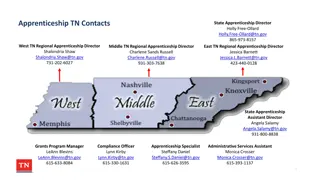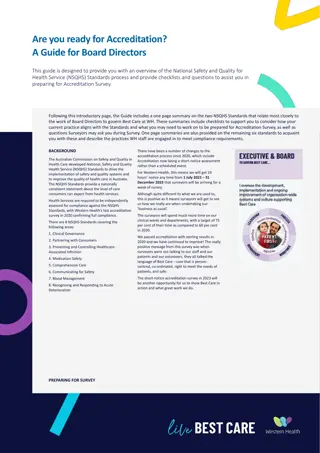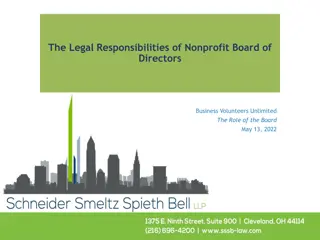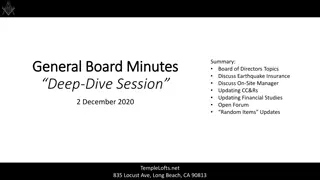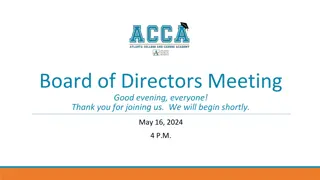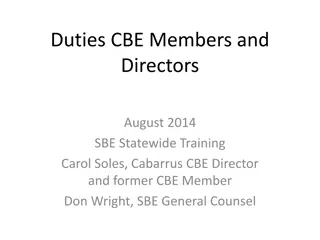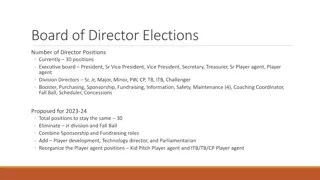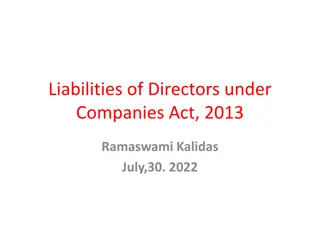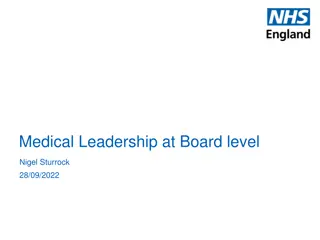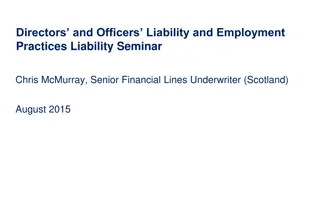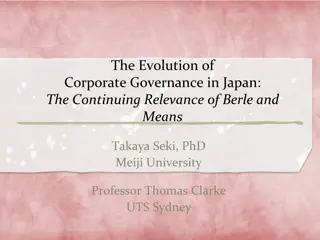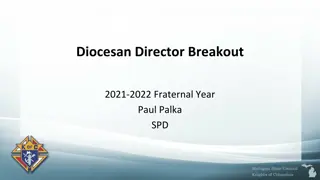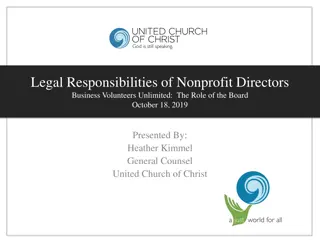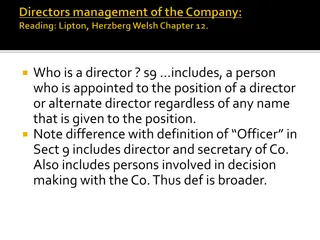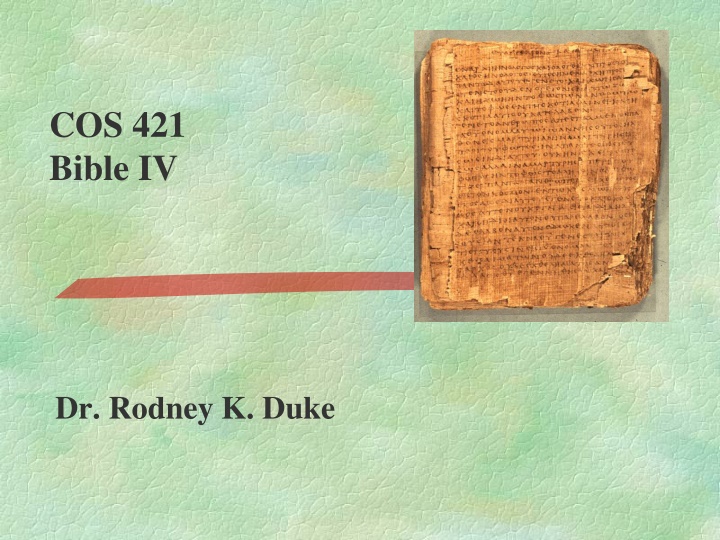
Update Contact & Board of Directors Info
This update includes changes in the contact section, removal/addition of board members, and sponsorship information. The Board of Directors list has been revised, and founding members have been updated. A new hyperlink to the event photo collection page has been added for easy access to event photos across multiple years.
Download Presentation

Please find below an Image/Link to download the presentation.
The content on the website is provided AS IS for your information and personal use only. It may not be sold, licensed, or shared on other websites without obtaining consent from the author. If you encounter any issues during the download, it is possible that the publisher has removed the file from their server.
You are allowed to download the files provided on this website for personal or commercial use, subject to the condition that they are used lawfully. All files are the property of their respective owners.
The content on the website is provided AS IS for your information and personal use only. It may not be sold, licensed, or shared on other websites without obtaining consent from the author.
E N D
Presentation Transcript
COS 421 Bible IV Dr. Rodney K. Duke
DAY 5 Assign: Homework assignment: Love Jesus and love your people. Day Objectives: 1) Identify the nature of biblical prophecy and prophetic literature. 2) Identify reasons for reading the prophets and look at some key prophetic texts 3) Evaluate the NT writers use of the OT prophetic literature. 4) Explain the nature of apocalyptic literature.
C. 1. recorded. (Case study) Speculate: a) (T) For what reasons, by whom, and in what form might this message have been preserved initially? How much would you expect the initial preservation to agree in form and content with what was literally spoken? b) (T) For what reasons, by whom, and in what form would this account have been preserved for later generations? How much would you expect this later account to agree in form and content with the first account? c) (W) What would you as a modern audience need to do or find out in order to understand the message as fully as possible? What comparisons and contrast to this process would you expect to apply to the message of the biblical prophets? Obj.: Explore why and how prophetic words might have been Point: Following generations must have believed that what happened had continuing meaning/application. They preserved the account.
C. 2. Obj.: Form an overview of OT Prophets and Prophecy. Prequestion (W): Define "prophet," and "prophecy" based on your own understanding. Read a Bible dictionary article on prophets, prophecy. (W) Explain how your definitions would change. If they would not change, what is something new that you learned?
Why Read the Prophets? (C. 3. Summarize what you learned about the prophets.) 1) Poetic value: Nahum 3:1-5 NIV Nahum 3:1-5a: Woe to the city of blood, full of lies, full of plunder, never without victims! 2 The crack of whips, the clatter of wheels, galloping horses and jolting chariots! 3 Charging cavalry, flashing swords and glittering spears! Many casualties, piles of dead, bodies without number, people stumbling over the corpses-- 4 all because of the wanton lust of a harlot, alluring, the mistress of sorceries, who enslaved nations by her prostitution and peoples by her witchcraft. 5 "I am against you," declares the LORD Almighty. Assyrian battle of Til-Tubal.
Why Read the Prophets? (C. 3. set a ) 2) Insight into others' personal struggles with God: Isa 6, Jer 1, Ezek 1-2: call of these prophets, each felt unworthy, each faced with difficult task. Jeremiahs struggles with his calling ( Laments )
2) Insight into others' personal struggles with God NIV Jeremiah 20:7-18 O LORD, you deceived me, and I was deceived; you overpowered me and prevailed. I am ridiculed all day long; everyone mocks me. 8 Whenever I speak, I cry out proclaiming violence and destruction. So the word of the LORD has brought me insult and reproach all day long. 9 But if I say, "I will not mention him or speak any more in his name," his word is in my heart like a fire, a fire shut up in my bones. I am weary of holding it in; indeed, I cannot. 10 I hear many whispering, "Terror on every side! Report him! Let's report him!" All my friends are waiting for me to slip, saying, "Perhaps he will be deceived; then we will prevail over him and take our revenge on him."
NIV Jeremiah 20:7-18 cont. 11 But the LORD is with me like a mighty warrior; so my persecutors will stumble and not prevail. They will fail and be thoroughly disgraced; their dishonor will never be forgotten. 12 O LORD Almighty, you who examine the righteous and probe the heart and mind, let me see your vengeance upon them, for to you I have committed my cause. 13 Sing to the LORD! Give praise to the LORD! He rescues the life of the needy from the hands of the wicked. 14 Cursed be the day I was born! May the day my mother bore me not be blessed! 15 Cursed be the man who brought my father the news, who made him very glad, saying, "A child is born to you-- a son!" 16 May that man be like the towns the LORD overthrew without pity. May he hear wailing in the morning, a battle cry at noon. 17 For he did not kill me in the womb, with my mother as my grave, her womb enlarged forever. 18 Why did I ever come out of the womb to see trouble and sorrow and to end my days in shame?
Why Read the Prophets? (C. 3. set b ) 3) Call to morality and values (popular in 3rd world countries): Isa 1:10-20, Jer 2:1-13: called people to repentance, etc. NIV Hosea 6:6 For I desire mercy, not sacrifice, and acknowledgment of God rather than burnt offerings.
3) Call to morality and values NIV Micah 6:1-8 Listen to what the LORD says: "Stand up, plead your case before the mountains; let the hills hear what you have to say. 2 Hear, O mountains, the LORD's accusation; listen, you everlasting foundations of the earth. For the LORD has a case against his people; he is lodging a charge against Israel. 3 "My people, what have I done to you? How have I burdened you? Answer me. 4 I brought you up out of Egypt and redeemed you from the land of slavery. I sent Moses to lead you, also Aaron and Miriam. 5 My people, remember what Balak king of Moab counseled and what Balaam son of Beor answered. Remember your journey from Shittim to Gilgal, that you may know the righteous acts of the LORD."
NIV Micah 6:1-8 cont. 6 With what shall I come before the LORD and bow down before the exalted God? Shall I come before him with burnt offerings, with calves a year old? 7 Will the LORD be pleased with thousands of rams, with ten thousand rivers of oil? Shall I offer my firstborn for my transgression, the fruit of my body for the sin of my soul? 8 He has showed you, O man, what is good. And what does the LORD require of you? To act justly and to love mercy and to walk humbly [carefully?] with your God.
Why read prophets? (2 of 2) (C. 3. set c ) 4) Hope for future: The prophets looked forward to a perfect time when God's rule would be established and all people would "know" God.
4) Hope for future NIV Isaiah 11:1-9 A shoot will come up from the stump of Jesse; from his roots a Branch will bear fruit. 2 The Spirit of the LORD will rest on him-- the Spirit of wisdom and of understanding, the Spirit of counsel and of power, the Spirit of knowledge and of the fear of the LORD-- 3 and he will delight in the fear of the LORD. He will not judge by what he sees with his eyes, or decide by what he hears with his ears; 4 but with righteousness he will judge the needy, with justice he will give decisions for the poor of the earth. He will strike the earth with the rod of his mouth; with the breath of his lips he will slay the wicked. 5 Righteousness will be his belt and faithfulness the sash around his waist.
NIV Isaiah 11:1-9 6 The wolf will live with the lamb, the leopard will lie down with the goat, the calf and the lion and the yearling together; and a little child will lead them. 7 The cow will feed with the bear, their young will lie down together, and the lion will eat straw like the ox. 8 The infant will play near the hole of the cobra, and the young child put his hand into the viper's nest. 9 They will neither harm nor destroy on all my holy mountain, for the earth will be full of the knowledge of the LORD as the waters cover the sea.
4) Hope for future NIV Jeremiah 31:31-34 "The time is coming," declares the LORD, "when I will make a new covenant with the house of Israel and with the house of Judah. 32 It will not be like the covenant I made with their forefathers when I took them by the hand to lead them out of Egypt, because they broke my covenant, though I was a husband to them," declares the LORD. 33 "This is the covenant I will make with the house of Israel after that time," declares the LORD. "I will put my law in their minds and write it on their hearts. I will be their God, and they will be my people. 34 No longer will a man teach his neighbor, or a man his brother, saying, 'Know the LORD,' because they will all know me, from the least of them to the greatest," declares the LORD. "For I will forgive their wickedness and will remember their sins no more."
MESSAGES OF THE PROPHETS (1 of 2) Pre-Exilic God is active in and sovereign over history. God's ultimate rule would be established in the distant future. Called people to faithfulness, away from idolatry. Called people to righteous behavior (vs. meaningless ritual). "Day of the LORD" will bring judgment on Israel, not just the nations. Called leaders (kings, priest, judges) into accountability. Called nation to depend on strength of God, not themselves or other nations. Judgment was coming unless there was repentance; finally, judgment was inevitable. Zion and the Temple were not invulnerable, God would abandon them in judgment.
MESSAGES OF THE PROPHETS (2 of 2) Exilic God was still with the nation, even in exile. Called people to avoid idolatry and practice righteousness. Promise of restoration, new covenant, nations would recognize God. Post-Exilic Called people and leaders to make God their priority, establish the cultic forms of worship and tithe. Assured people that God was working through their current leaders despite their lack of independence. Promise of restoration and ultimate rule of God.
Daniel (1 of 5) Genre: apocalyptic, with narratives Nature of Apocalyptic: Setting: "underground" literature of oppressed people (primarily Jewish) for whom symbolic language is a "code" not to be understood by oppressors. Form: narrated accounts of visions and dreams, often with angelic interpretation; heavy use of symbolism: numbers and strange animals, many in fantasy forms rather than realistic forms. Function: set present struggle in light of cosmic, spiritual perspective and in light of ultimate victorious outcome, in order to guide and encourage audience to be faithful. (Daniel 3:16-18) Main theses: God is in control of history; conditions will not improve in this age; one is to live faithfully until God ushers in Age to Come / Kingdom of God.
Daniel (2 of 5) Interpretive Approaches to Book of Daniel [Revelation]: Preterist: focuses on original historical setting, what the text meant. Weakness: ignores what text "means" to community of faith. Historicist: interprets as forecast of course of history (up to time of interpreter). Weakness: very subjective, little agreement, tends to ignore what text meant. Futurist: reads as a guide book for events yet to come. Weakness: ignores what text meant and what it means to contemporary community. Idealist: interprets as a timeless expression of basic principles regarding the activities of God and the community of faith. Weakness: sees no ultimate consummation of Kingdom of God in history.
Daniel (3 of 5) Duke: Suggested "Blended" Approach: Typologico-historical: 1) Start with preterist perspective to ground symbolic language in its original setting, while 2) recognizing historicist perspective that text speaks of a real historical consummation of Kingdom of God, the pattern of which, 3) applies typologically (idealist) to the ongoing experiences of the community of faith.
Daniel (4 of 5) Suggested Reading Tips/Strategies: 1) Read for overall story-line and message of the whole work. 2) Read each vision looking for the impact of the whole. Do not focus on and allegorize all of the details. 3) Explore allusions to other OT texts to get some control over the symbols and theological perspective. 4) Look for internal interpretation of images. 5) Recognize distinction between "oppression," which is the experience of the community of faith and "wrath," which is judgment on the opponents of God. 6) Identify how events fit typologically with the current setting of the community of faith and look for the book's message for such situations today, but exercise great caution about reading as blueprint for specific historical events.
Daniel (5 of 5) Irenaeus, Bishop of Lyons ca. 139-200, said: [In regard to using the number 666 in the Book of Revelation to predict the person of the Antichrist] It is therefore more certain, and less hazardous, to await the fulfillment of the prophecy, than to be making surmises, and casting about for any names that may present themselves, inasmuch as many names can be found possessing the number mentioned; and the same question will, after all, remain unsolved. Against Heresies, Book V. in The Ante-Nicene Fathers (Grand Rapids: Eerdmans, reprinted 1973), vol. 1, xxx. 3, p.559.


